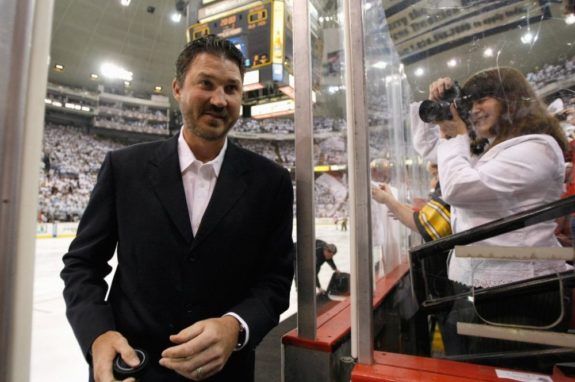Mario Lemieux has not only been a legend for the Pittsburgh Penguins on the ice since 1984 but also off the ice since 1999 when he and a group that included businessman Ron Burkle took ownership of the team. Over 20 years later, the Penguins find themselves under a new ownership group.
As indicated by multiple reports, the Penguins organization has been sold to Fenway Sports Group. The Boston-based group owns most notably Major League Baseball’s Boston Red Sox and Liverpool F.C. of the British Premier League. It was originally reported that “advanced talks” were being had between the two groups. Now, a deal is done.
About Fenway Sports Group
Fenway Sports Group Holdings, LLC (FSG) was founded in 2001 by John W. Henry and is currently chaired by Tom Werner. Aside from owning the Red Sox and Liverpool, FSG also has a NASCAR team, Roush Fenway Racing, a majority stake in New England Sports Network (NESN) and has now added the Penguins to their system. Reports indicate that FSG came to Lemieux and the Penguins to discuss a deal.
With a deal finalized a few weeks after the initial announcement, the buying price has been set at $900 million.
Related: Remembering What Made Mario Lemieux the Greatest
Since their creation in 2001 and taking over the Red Sox in 2002, FSG has turned the Boston MLB franchise into one of the most powerful and notable teams in the league. In 2004, the Sox curbed the “curse of the Bambino” and ended an 86-year drought between World Series victories. Since then, they’ve regularly reached the MLB’s postseason and won three more World Series championships.
They took over control of Liverpool F.C. in Oct. 2010. When it comes to soccer (football), the Reds are one of the most recognizable organizations across the globe. FSG has backed a successful team that regularly battles in tournaments and Cups across the world. In 2019-20, Liverpool won the Premier League Cup, their first BPL Cup in 30 years.
FSG holds an 80% ownership stake in the regional cable television provider New England Sports Network (NESN). Regional sports like the Red Sox and Boston Bruins are the main broadcasts on the station.
Basketball icon LeBron James is also an investor in FSG. While that doesn’t mean James will be sitting in on NHL Draft meetings or free agency decisions, it does technically make him a minority owner.
Penguins Under Lemieux Ownership
The Penguins previous ownership group consisted of Lemieux and Burkle under the name Lemieux Group LP. Those two joined forces to buy the team in 1999 when the franchise was in the throes of a new bankruptcy battle. Not only were the Penguins going through a second bankruptcy, but options of a relocation were being discussed.

Under Lemieux’s ownership, the organization was able to pull itself out of debt, build a new arena, and continue to call the City of Pittsburgh home. During Lemieux and Burkle’s tenure as owners, the Penguins won three Stanley Cups, and only missed the playoffs four times.
This isn’t the first time the Lemieux Group has made an attempt to put the team up for sale. Prior to winning back-to-back Stanley Cups in 2016 and 2017, the Penguins were put on the market by Lemieux and Burkle. No sale was made, and between Cup victories, the Penguins were pulled from the market.
Pens fans have no need to worry about the franchise’s savior leaving any time soon. Lemieux and Burkle plan on sticking around as partial owners and will remain involved with hockey operations. FSG is stepping in as the majority leader. It is not yet known who will take the lion’s share of the responsibilities from FSG.
With new ownership often comes worries of a team’s relocation or potential downfall. That won’t be the case here since the Penguins are locked into their agreement with PPG Paints over naming rights for the arena until 2036. And due to league rules, teams under new ownership cannot relocate within seven years of the initial purchase.
There shouldn’t be much change on the ice when it comes to new ownership, just more financial stability and maybe some behind-the-scenes switches. The Penguins are staying home in Pittsburgh and will have new leaders in doing so.
